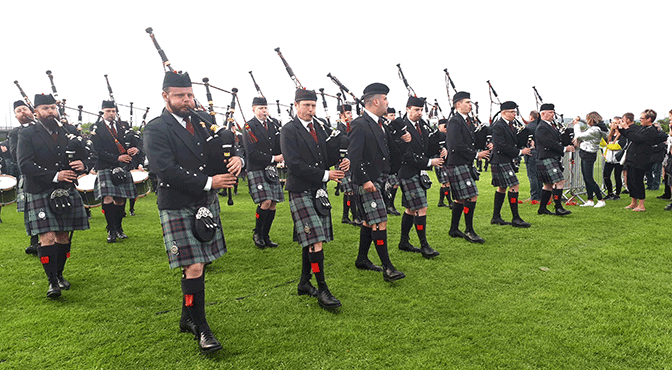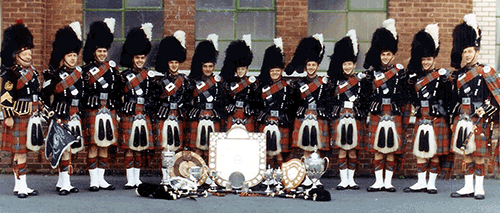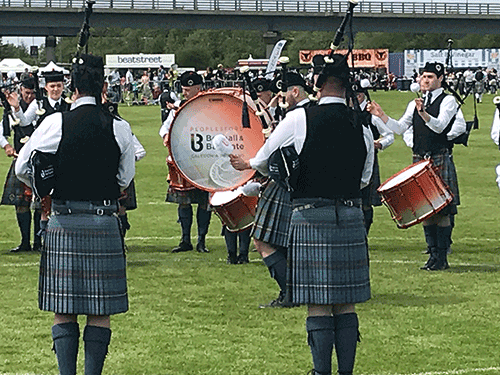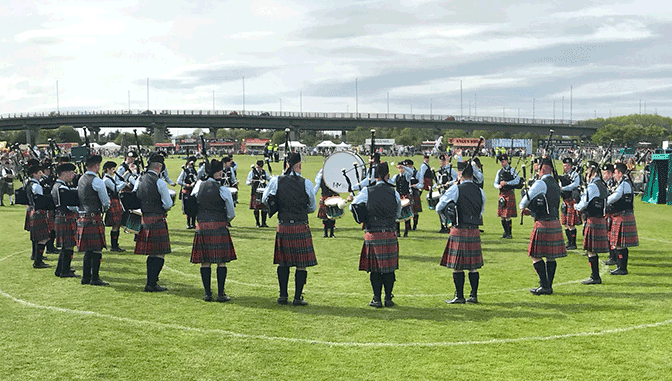

By Alistair Aitken OBE,
former RSPBA Adjudicator and not MacStig!
Now that the RSPBA’s 2018 outdoor pipe band competition programme is in full swing I have been asked to give general views about some of the contest venues and observations about results etc., with a historical slant where possible.
The outdoor season started with a bang with five outdoor competitions over the same weekend – Dunbar and Bangor (Northern Ireland) on Saturday 12 May and Gourock, Dundee City and Banchory all on Sunday 13 May. Unusually for Dunbar and Gourock the weather was good. I have spent many a day judging at Dunbar in windy and freezing conditions; and at Gourock in mud, mist and driving rain. In my experience the Dunbar contest has seen three different locations around the town over the years, none of which provided much shelter from the bitter windy blast from the Forth estuary. The current location is probably best in terms of space but the bands and adjudicators now have to cope with the sound of the passing trains on the adjacent East Coast main line.
Having five contests over the same weekend resulted in fewer entries at each and it is unfortunate that at Dunbar there were no Grade 1 bands and seven of the ten entrants in Grade 2 were from lower grades. Gourock on the other hand had a strong entry of five Grade 1 bands, all from the west of Scotland; and there were four Grade 1 bands at Bangor. In Grade 1 Field Marshal Montgomery started with a win at Bangor as did Inveraray at Gourock (although the results showed that they were run close by Scottish Power and Glasgow Police). It will be interesting to see how these bands and the winners in the lower grades at these first contests fare as the season progresses. Closkelt, Johnstone 3B, Dunbar RBL and Dollar Academy (with two different grade bands) maintained their winning ways at the British Pipe Band Championships at Paisley last Saturday.
[wds id=”2″]
On then to the first of this year’s major championships. Now in its third year at Paisley’s St James’s Park, and due to continue there for another three years, the venue is spacious and well placed for travel by air, road or train. Entry and parking are also free. The weather proved to be terrific, very hot and sunny all day. The one downside is the proximity of Glasgow Airport and the frequent noise from aircraft taking off as the bands are performing. This year was no different. The contest circles were spread out much better to avoid overlapping band sounds. However, planes were taking off about every ten minutes and at the start of the Grade 1 contest the first few bands were also affected by loudspeaker announcements from other arenas. Talk about conflicting drone sounds!! Thankfully the announcer problem was quickly rectified.
From a historical viewpoint, the British Pipe Band Championships have seen nine different venues over the past 16 years including this year – Pitlochry (twice), Turriff, Tain, Ballymena (Northern Ireland), Birmingham, Banbridge (Northern Ireland), Annan (three times), Bathgate (three times) and then Paisley. During that time, again including this year, the Grade 1 contest has been won by Field Marshal Montgomery on nine occasions, Shotts & Dykehead Caledonia (twice), Inveraray & District (twice), and Strathclyde Police (now Glasgow Police), St Laurence O’Toole and Scottish Power (pictured top) once. These stats probably illustrate the difficulty of breaking the monopoly of these top bands. Many readers of Piping Press may not know that the World Pipe Band Championships were also held in Paisley on one occasion, as far back as 1957. The Grade 1 honours that day went to Shotts and Dykehead Caledonia under Pipe Major J K MacAllister.

As always I met many people I had not seen for some time. It was particularly good to see Kevin Reilly, the former RSPBA Chairman, looking so well after his recent health scare, and in his usual place supervising the compiling of results.

During the day I was able to listen to a few performances in the Juvenile Grade, where the quality of teaching of piping and pipe band drumming is always evident. I also listened to a number of the performances in Grade 3B including the impressive Johnstone and St Marys Derrytrasna bands which eventually took first and second places respectively. I then witnessed the whole Grade 1 contest and chose to listen from the front of the competition circle where I could get a better impression of the pipe band ensemble effect and the clarity of the drumming coming through the piping.
This was a Medley competition, each band having to submit in advance two Medleys and then draw at the starting line the one to be played. This type of competition can be very entertaining to listen to but I was a little disappointed by the tune selections of some of the bands, which seemed to focus too much on finger dexterity rather than musical effect. Add to that long and varying transitions between tunes, and some complicated harmonies, the melody line often became lost in the mix. It makes me wonder just how far the boundaries of traditional pipe band music can be stretched.
I have no desire to comment on any of the results as I am well aware of how difficult it is to judge pipe band competitions to the satisfaction of everyone. There were, as always, some wide differences between individual adjudicators which many band personnel and spectators might find difficult to comprehend, but music affects the emotions of everyone in different ways so there will always be differences of opinion. Many attempts have been made over the years to remedy this but unfortunately there has been little success.
Another aspect which struck me was how many bands across the different grades do not appear to think about the sound balance between pipes and drums in terms of both pitch and weight. Many drums corps play in an intense and forced manner with the aim of demonstrating technique and degree of difficulty, whereas subtlety is essential to producing musical influence on the piping melodies. As I have often argued before it is a ‘pipe band’ competition. Some of the tenor drum sections I also found visually rather over regimented although impressively integrated. The fluency of flourishing appears to have been lost to an extent.
Those Grade 1 performances which stood out in particular for me personally, in the order they played, were: Peoples Ford, Boghall and Bathgate Caledonia produced a very high quality performance and are certainly back in the mix this year. The performance on Saturday was well-balanced with a nice sweet piping sound. The playing was bright and clear, and the drum corps projected very well through the pipes enhancing the overall effect musically.

Inveraray and District had another strong performance, although on this occasion I would describe the playing as more clinical than musical. Tempos seemed a little laid back and the sound balance from where I was standing was affected by rather heavy snare drums. I think I counted eleven snare drummers and that may have affected the ensemble to an extent. I suspect that the slow air may have been a tribute to the young piper from Barra who lost her life in the Manchester bombing. If so, a nice gesture!
St Laurence O’Toole gave a strong musical performance in their own distinctive style. The precision was excellent but I thought the band’s sound balance was affected by rather flattish and heavy snare drums projecting through, although I hasten to add that the style of drumming is very influential. The bass and tenors also contribute very well.
Scottish Power had an excellent piping sound and a very strong performance with clear projection of the different time signatures, particularly the strathspey dance rhythm. My only criticism was that, although the drumming was very influential musically, it projected through the pipes a shade on the light side and at times the bass and tenors were a little dominant.

Field Marshal Montgomery, last to play, did not disappoint with a performance which reflected their usual immaculate playing. The performance had an excellent balance of sound, precise execution and effective grouping of melodies, all of which combined very well musically as is the band’s hallmark.
Having singled out these bands in particular I have no wish to diminish in any way the presentations of the other contestants. There were other contenders as all the bands had strong performances including the two new entrants to Grade 1. Competition at this level is very fierce and I think the outcome of the British Championships demonstrates that Grade 1 results will be very interesting during the season with the ultimate prize in August being highly competitive.
• Read the Editor’s review of Grade 1 at the British here.
• Read MacStig’s review of Grade 2 at the British here.
[wds id=”2″]















